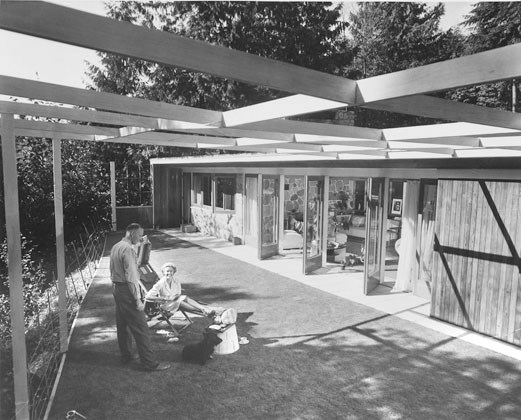Heritage preservationists fighting to stop the sale of West Vancouver's historic Binning House have been granted a reprieve by the courts and picked up a powerful ally.
The Land Conservancy, a non-profit in bankruptcy protection, was hoping a B.C. Supreme Court judge would approve the sale of the property to a subsidiary of the Wall Finance Group in court on Monday afternoon.
The former home of artist and architect B.C. Binning is regarded as the first example of West Coast modernism. When Binning's widow Jessie passed away in 2007, the home was handed over to trustees with instructions to find someone to take it over who will preserve the home for its historical value and allow public and scholarly access to it.
TLC has held the property on Mathers Crescent since 2008 but recently agreed to sell the house and its contents for $1.6 million to help the non-profit out of its $7.5 million debt, if it can get court approval.
Joining the District of West Vancouver and the University of British Columbia in opposing the sale is the Ministry of the Attorney General, which filed a submission on Friday stating the sale would run afoul of the Charitable Purposes Preservation Act.
The province passed the act in 2007 to make sure assets donated for specific charitable purposes remain charitable and not be sold.
At issue for the ministry is not whether Jessie's will is respected, but whether TLC has the right to sell land that was gifted to it by trustees of Binning's estate.
"As a consequence, TLC has no beneficial interest in Binning House," the submission states. "Further, this court should not approve any sale or further transfer of Binning House other than to a purchaser or transferee who takes the property as a discrete purpose charitable property under the act and subject to the trust for specific charitable purposes."
But Jessie's will was never explicit that there be public access, and public access since TLC took over the property has been limited and inconsistent, said TLC manager John Shields.
"The argument of public access isn't based on there being very much public access in the last few years. It's a hypothetical, I think," Shields said. "We understood that Mrs. Binning wanted the house to be preserved, the historical character of the house being significant. That's always been the centrepiece of the will."
When the buyer came along promising to restore the home to its former glory, it appeared to be the best-of-both worlds scenario, Shields said.
"It looked like it was completely in accord with Mrs. Binning's will and while there are other people arguing different points of
view, that point of view still persuades me that this is going to be a good thing for the house and a good thing for the community and for TLC. That's the basis on which we're going forward," he said.
Regardless of what a judge may decide on the points of law, the spirit of Jessie's will was that the house remain open to the public and academics who want to appreciate it for its historical value, according to Adele Weder an architecture journalist and friend of Jessie's.
"I feel beholden to Jessie. I sat there and listened to her say what she wanted for her house and fretting about how to actually do it. It's personal," she said Lawyers for each group are expected back in court in mid-December.



